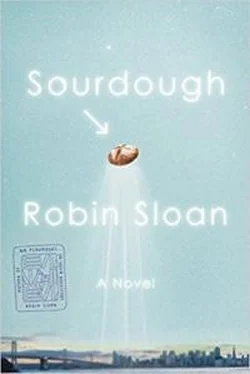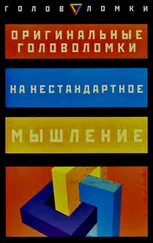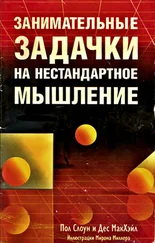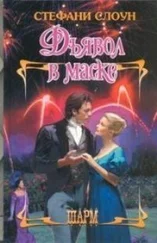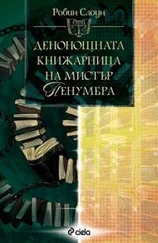Where—was—the crew?
The workstations had a rough-and-ready look, but this was no shantytown. The floor gleamed; I saw shoe prints over the swirled track of a mop. Power cords snaked across the yellow-tape road, routed securely beneath plastic channels. The arrangement was improvised but not anarchic. There was a power grid. There was a plan.
I stepped off the yellow-tape road to investigate one of the portals and its prom light. Beyond, there was a squarish space about as big as my apartment, the far wall marked A3 in paint with the same level of flakeage as the stripes on the floor, and both sides of the room were packed with bushy vegetables in trays on tall racks fitted with lights blaring fuchsia. Was that lettuce? Kale? The greens looked black in the weird light. The next portal opened into room A4, which definitely held broccoli. Cauliflower? No, broccoli.
When I turned back to the concourse, it took a moment for my eyes to adjust. I heard the hum of air circulation, the chirp of unseen electronics, and above the hum, below the chirp, I detected murmurs. Voices. The crack of laughter.
I returned to the yellow-tape road, passing more workstations and more pink-light portals on both sides and, in one place, a line of glass-faced industrial refrigerators grumbling and clicking. The road ran straight through them, like a grocery store freezer aisle. The refrigerators were full of tubs and boxes, all with handwritten labels. I shivered.
Ahead, the road bent sharply around a line of enormous planter boxes supporting bushy, dark-leafed trees, their branches heavy with lemons. Above them, the ceiling broke open and admitted a cylinder of hazy sunlight through a smudgy grid of glass.
On the other side of the pop-up lemon grove, I found the crew—dozens strong, all sitting together at a superlong picnic table, talking and eating. Tattoos flashed on wrists and forearms as they passed dishes and poked forks. Men and women, mostly young, but a few with gray hair or bald heads.
Near the middle of the table, a figure rose. It was the queen of the underworld in her slouchy black leather jacket: Lily Belasco.
“Baker!” she called.
A few heads swiveled, and those few regarded me amiably. Belasco beckoned, and I went to her, holding my bone-key token in front of me as I approached, as if it were an amulet of protection. “You invited me here,” I said. A reminder, and maybe also an accusation.
Belasco wiggled her hands and the people sitting across from her scooched apart dutifully. I wedged myself between them—a man and a woman. The man, who was broad-bellied and round-cheeked, began building a plate. The woman, who was as tiny as an elf, reached for an unlabeled growler and filled a jam jar with dark beer.
“This is Lois,” Belasco said to everyone within earshot, “a very talented baker.” This was followed by silence. I got the sense maybe everyone within earshot was a very talented baker. Belasco continued: “She also programs robots.” That earned a raised eyebrow from the elf girl and a few murmurs of interest farther down. “Lois, this is Horace”—the round-cheeked man—“who managed the bookstore at the Ferry Building before joining us as our … What are you, Horace, the archivist?”
“Librarian,” Horace said neatly.
“And this is Orli”—the elf—“who sells cheese.”
I looked down at the plate Horace had built for me: brown rice with green onions and sesame seeds, dark glistening greens, a curl of what appeared … to be … octopus. I’d never eaten octopus. I looked up at Lily Belasco. “What is this place?”
She waved the question away. “First, eat. Gracie was just showing us her new acquisition.” She turned to the woman next to her, wide-framed with dark freckles, who cupped a jar on the table in front of her.
“Chernobyl honey,” Gracie said.
“Surely not,” Belasco scoffed.
Gracie nodded firmly. “It’s gone back to nature,” she explained, “and the bees, they filter out the radioactivity. Most. Enough.” She unscrewed the jar, offered a taste. Belasco dipped her spoon and lifted it, trailing a strand that seemed to glow faintly. Put it between her lips, let it sit. Her eyes glittered. “Try it,” she said to all of us seated around her. “Try it, try it.”
The elf—Orli—dipped her spoon. Horace dipped his, too, and from him the Chernobyl honey earned a rumble of appreciation that was conducted by the bench into the soft flesh of my thighs.
Gracie tipped the jar toward me. “Try some, baker.” The gesture was solicitous, but her eyes glinted challenge.
In every legend of the underworld, there is the same warning: Don’t eat the food. Not before you know what’s happening and/or what bargain you’re accepting.
Along the length of the table, wide dishes bobbed up and down, orbiting on currents of camaraderie. I saw faces smiling and serious, all lit by the hazy light from above, but haloed with pink from the portals on both sides. Across the table, Lily Belasco watched me with dark eyes. I had come this far.
I dipped my spoon.
IN SAN FRANCISCO, there was an older woman, a Russian, the sister of Shehrieh’s landlord in Brussels from long ago, back before either Chaiman or I was born. (I’m laughing here, because this is how every Mazg story starts: “My old landlord.” The Mazg are inveterate renters.) Anyway, this Russian owns many buildings on Clement Street. She offered us an apartment, but the kitchen had no oven, just a hot plate, and when we asked for a different one, she said, You’re going to get me in trouble! But she couldn’t refuse, because many years ago, Shehrieh did something very kind for her sister.
This is such a Mazg story, it’s sort of embarrassing.
Anyway, Chaiman and I got an apartment with an oven. It wasn’t very big, but I felt comfortable there, and that’s where the phone rang when you called me all those times.
THE FAUSTOFEN
“THE MARROW FAIR is a new kind of market,” Lily Belasco explained. Picnic dinner was over and everyone who had tasted the Chernobyl honey was still alive. I was following her away from the lemon grove, back up the yellow-tape road, the way I’d come. “It’s an experiment, a place for new ideas. New tools. New food.”
“What is this place , though?” I asked.
“Oh. Back when the base was operational, this was a munitions depot. Don’t you love it? Long and skinny, like a mirror-image Ferry Building.”
Like an underworld Ferry Building. Yes, I could see why this space appealed to Lily Belasco. As above, so below!
“They kept missiles down here,” she continued. “Lifted them up through there”—she pointed back toward the skylight—“into planes, I guess? Don’t worry. The floor isn’t radioactive anymore.”
There was a lot of weird light for a place that wasn’t radioactive …
“Those are grow rooms. All pink LEDs! Apparently, plants absorb that portion of the spectrum more efficiently. Ask Kenyatta, he’ll tell you more.”
Belasco pointed out workstations as we passed them: “That’s the coffee bar. Naz Kalil runs it—he was Greenlight Coffee’s first barista. Over there they make a new kind of smoothie. Look closely before you try one. Around that corner—cricket cookies. I can smell them. Mmm.”
We arrived at a place close to the door where I’d entered, far from the light of the lemon grove. There was a workstation here, shadowed and bare. “Here we are. This is where I want you and your robot.”
There had been a misunderstanding. “I don’t have a robot. I just work on them.”
Belasco groped the depot’s wall to find a switch that brought cold fluorescent tubes sparking to life above the workstation. It was outfitted with the same basic accoutrements as the rest—a countertop, some wire shelves, an industrial sink—and it boasted, in addition, a ping-pong table with no net, one folding chair (currently folded), and, finally, an elephantine bread oven, gray and stoic, the size of a small car.
Читать дальше
